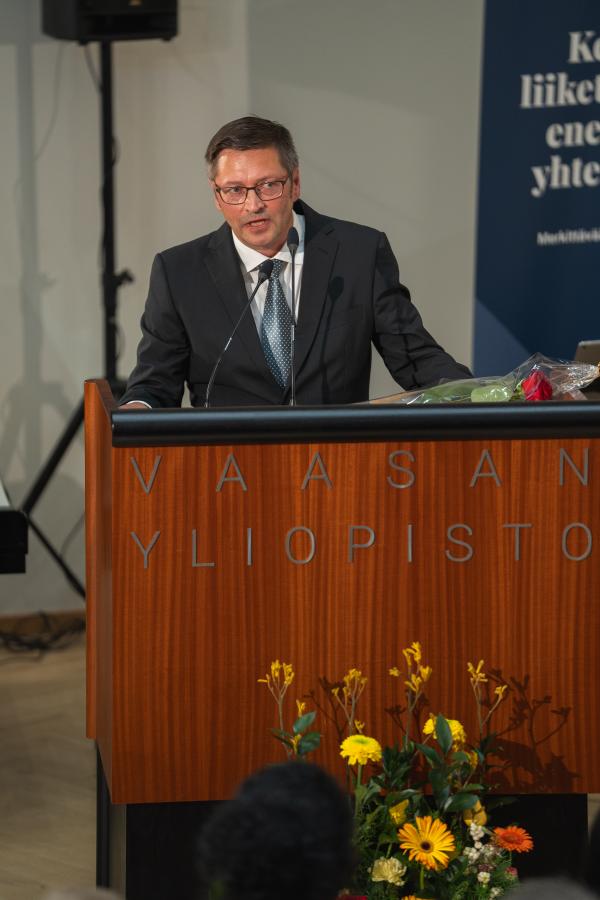The award-winning article focuses on the generalisation of heat pumps and the development of the heat pump market in Finland. This analysis has resulted a new way to study technology generalisation.
Jouni Juntunen's article, "Series of configurational movements: user activities in technology generalization" was published in Technological Forecasting & Social Change. The article was co-authored by Professor Sampsa Hyysalo from Aalto University, with whom Juntunen has collaborated for many years.
Associate Professor Juntunen stated that the award is particularly meaningful to him because it recognises his long-term research.
– In my doctoral dissertation, I focused on heat pumps, user innovations, user modifications and user communities that support the generalisation of technology. This research has continued ever since. In this article, we have used a wide range of data to examine and theorise how the generalisation of technology occurs.
According to Juntunen, the study aims to demonstrate that the process of technology generalisation is complex and involves different stages. The analytical approach developed in the study describes this process as a series of configurational movements, which explores the dynamic changes in technology and its actors.
– Technology generalisation has been studied both as a long-term systemic transition and in detail at the local and practice level. The first approach takes a high-level view and often does not clearly illustrate technological changes. The second approach provides detailed snapshots of actors and practices. We observed that theoretical and methodological renewal is possible, and generalisation can be understood as a series of configurational movements. We can examine over a long period how the character of the technology, the ecology of actors, and the context in which the technology spreads change. In the article, we exemplified this by investigating the generalisation of heat pumps in Finland, says Juntunen.
The generalisation of heat pumps in Finland is part of the energy transition
According to Juntunen, the spread of heat pumps in Finland is a good example of how technological development and user activities supporting generalisation go hand in hand.
Geothermal energy and geothermal heat pumps came to Finland in the 1970s, spurred by the oil crisis. This was followed by a quieter period. It was not until the 1990s, when the technology developed globally and air-to-air heat pumps began to be imported to Finland, that the heat pump market started to grow. In the early stages, there was user customisation as pumps were modified to be better suited for Finnish homes. Users shared information about heat pumps and learned from each other, which boosted the spread of heat pumps.
Heat pumps are part of the energy transition, where fossil fuels are being replaced by renewable and decentralised forms of energy production.
– In total, around 1.5 million heat pumps have been sold in Finland. According to the IEA, the pumps currently in use produce approximately 14 terawatt hours of energy annually. The scale of investment is staggering: in 2022 alone, one billion euros was invested in heat pumps in Finland, says Juntunen.
For Juntunen, the publication of his article in Technological Forecasting & Social Change was an important milestone. The journal is rated at the highest level (JUFO3) by the Finnish Publication Forum, which evaluates scientific publishing.
– It was the first time I had published in this journal. The research data was robust, and the analysis was conducted with scientific rigour.
Support for energy sector research
The Ostrobothnia Chamber of Commerce Award is granted for research, publication, or a doctoral dissertation related to the energy sector and conducted at the University of Vaasa during the previous academic year.
– The strong energy technology cluster in the Vaasa region requires close collaboration with top-tier research to continue developing. With the award, the Ostrobothnia Chamber of Commerce aims to support energy sector research at the University of Vaasa and increase the visibility of the field, says Maijastiina Jokitalo, Training and Liaison Manager at the Ostrobothnia Chamber of Commerce.
According to Jokitalo, the award-winning research provides innovative insights for the energy sector, which is becoming increasingly important due to the ongoing the energy transition.
– The study provides interesting insights into the role of users in the adoption, diffusion and generalisation of new technologies.
The award-winning article is open access:
- Hyysalo, S., & Juntunen, J. K. (2024). Series of configurational movements: User activities in technology generalization. Technological Forecasting and Social Change, 200, 123158. https://doi.org/10.1016/j.techfore.2023.123158.
Further information
Associate Professor Jouni Juntunen, University of Vaasa, tel +358 29 449 8619, jouni.juntunen@uwasa.fi

